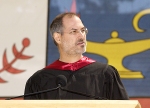(Note: the links are to the text of each of these speeches. You can also find the video of each with little trouble. And there are plenty of “compilations” of the “best commencement speeches of 2012” out there, like this one).
—————
I like commencement addresses. I do not remember the one I heard when I graduated. I do remember the speaker (not the message; the speaker) at my wife’s graduation. But I’ve liked them more and more as the years have rolled on.
 I suppose my favorite is Steve Jobs at Stanford, as I suspect you would suspect if you’ve read my blog for very long: “Stay Hungry. Stay Foolish. And I have always wished that for myself. And now, as you graduate to begin anew, I wish that for you. Stay Hungry. Stay Foolish.”
I suppose my favorite is Steve Jobs at Stanford, as I suspect you would suspect if you’ve read my blog for very long: “Stay Hungry. Stay Foolish. And I have always wished that for myself. And now, as you graduate to begin anew, I wish that for you. Stay Hungry. Stay Foolish.”
But there are a lot of other good ones, and they keep coming. This year, we’ve had Aaron Sorkin at Syracuse: “…make no mistake about it, you are dumb. You’re a group of incredibly well-educated dumb people.” And David Mccullough, Jr. at Wellesley High School (at a high school – I like that): You are not special. You are not exceptional.
But, having presented synopses of five different books by Michael Lewis (including The New New Thing; Moneyball; The Big Short), it is not a surprise that moving near the top of the list of my favorites is Michael Lewis at Princeton in 2012. It is filled with Michael Lewis quality observation and insight. Here is a great excerpt. I’ve bolded what I think is the key line.
I wrote a book about this, called “Moneyball.” It was ostensibly about baseball but was in fact about something else. There are poor teams and rich teams in professional baseball, and they spend radically different sums of money on their players. When I wrote my book the richest team in professional baseball, the New York Yankees, was then spending about $120 million on its 25 players. The poorest team, the Oakland A’s, was spending about $30 million. And yet the Oakland team was winning as many games as the Yankees — and more than all the other richer teams.
This isn’t supposed to happen. In theory, the rich teams should buy the best players and win all the time. But the Oakland team had figured something out: the rich teams didn’t really understand who the best baseball players were. The players were misvalued. And the biggest single reason they were misvalued was that the experts did not pay sufficient attention to the role of luck in baseball success. Players got given credit for things they did that depended on the performance of others: pitchers got paid for winning games, hitters got paid for knocking in runners on base. Players got blamed and credited for events beyond their control. Where balls that got hit happened to land on the field, for example.
Forget baseball, forget sports. Here you had these corporate employees, paid millions of dollars a year. They were doing exactly the same job that people in their business had been doing forever. In front of millions of people, who evaluate their every move. They had statistics attached to everything they did. And yet they were misvalued — because the wider world was blind to their luck.
This had been going on for a century. Right under all of our noses. And no one noticed — until it paid a poor team so well to notice that they could not afford not to notice. And you have to ask: if a professional athlete paid millions of dollars can be misvalued who can’t be? If the supposedly pure meritocracy of professional sports can’t distinguish between lucky and good, who can?
The “Moneyball” story has practical implications. If you use better data, you can find better values; there are always market inefficiencies to exploit, and so on. But it has a broader and less practical message: don’t be deceived by life’s outcomes. Life’s outcomes, while not entirely random, have a huge amount of luck baked into them. Above all, recognize that if you have had success, you have also had luck — and with luck comes obligation. You owe a debt, and not just to your Gods. You owe a debt to the unlucky. I make this point because, along with this speech, it’s something that you’re very likely to forget.
 In an interview on PBS Newshour about the speech, Michael Lewis added these thoughts:
In an interview on PBS Newshour about the speech, Michael Lewis added these thoughts:
But I do think that there has been kind of sapped out of the culture an idea that used to be pretty robust. And it’s the idea of noblesse oblige. It’s the idea that to whom much is given, much is expected from.
And it’s an idea that it’s — you know, it’s the heart of the Princeton education. When you get there, they tell you, the motto is, in the nation’s service.
I would say that, look, that the successful in our society owe so much of their success to things outside of themselves. They owe it to the society, that they’re born into this affluent and peaceful society that was not of their making, that they should acknowledge that obligation.
And I think you see a lot of — a lot of fight-back on that subject. And you see it — you mean, you see it in the tax code. You see it in the way private equity managers manage to construe their income as capital gains, so they don’t have to pay taxes on it. You see it in CEO pay.
You see it in — you see it in the way Wall Street people pay themselves. So I think that — that even to — even to put the question into the minds of young people of what they owe is maybe a novel concept, because there are an awful lot of people who sit on top of the society who don’t feel that way.
Having said that, you know, I do think that one of the things that distinguishes our country from, say, Greece, is that we do have this notion that you give back. If you look at Greek culture and why — and why the place over there is crumbling right now, part of the problem is the elites feel they owe the place nothing. They don’t pay taxes. They don’t — they have no real organic relationship with the rest of the place, and they certainly don’t have a sense of noblesse oblige.
It’s sort of winner take all. And that’s something I think we need to really fight hard to avoid here, because when we get to that point, I do think the society starts to crumble. So this was on my mind when I wrote this talk. And I confess I’m a little surprised you’re interested, because, to me, it just seems obvious.
People go to their graduations, and promptly forget what they barely heard to begin with during the graduation speech. And people read books, and articles, and blog posts, and promptly forget what they hear and read.
But maybe we should remember. Maybe we should remember on purpose – you know, call to mind, and pay attention to… “You have an obligation to the unlucky.” An obligation! – to the unlucky. This is something we should all remember, and pay a hefty amount of attention to, don’t you think?

[…] “You Owe A Debt To The Unlucky” – Michael Lewis … – Jun 14, 2012 · “You Owe A Debt To The Unlucky” – Michael Lewis Gives The Best Commencement Advice Of 2012… […]